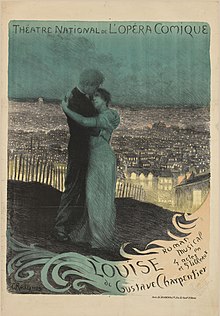Louise (opera)
| Louise | |
|---|---|
| Opera by Gustave Charpentier | |

Poster by Rochegrosse for the opera's premiere
|
|
| Librettist | Gustave Charpentier |
| Language | French |
| Premiere | 2 February 1900 Opéra-Comique, Paris |
Louise is an opera (roman musical) in four acts by Gustave Charpentier to an original French libretto by the composer, with some contributions by Saint-Pol-Roux, a symbolist poet and inspiration of the surrealists.
The opera depicts Parisian working-class life. However the city itself is in many ways the true star of this very atmospheric work – invoked at various points during the opera. A French example of verismo opera, it tells the story of the love between Louise, a seamstress living with her parents in Paris, and Julien, a young artist. It is the story of a young girl's desire for freedom (associated in her mind with her lover and the city of Paris).
Charpentier later wrote a sequel to Louise, the opera Julien, which describes the artistic aspirations of Louise’s suitor.
Louise premiered on 2 February 1900 at the Opéra-Comique conducted by André Messager in a production by Albert Carré. It was successful, reaching its 100th performance just over a year later; the 500th performance at the Opéra-Comique took place on 17 January 1921, and by the early 1950s it had reached over 950 performances. The opera helped launch the career of the soprano Mary Garden, who sang Louise in Act 3 at the eighth performance. On 30 April 1900 the Opéra-Comique director Albert Carré gave away 400 seats to Paris dressmakers.
The success in Paris led to productions in Algiers, Brussels, Budapest and Milan in 1901 and in Berlin, Prague, Vienna, Geneva and Stockholm in 1902, followed by other cities. First seen in New York City at the Manhattan Opera House in 1908, Louise was premiered by the Metropolitan Opera on January 15, 1921 (with Geraldine Farrar in the title role and Flora Perini as Gertrude). It was revived at the Met in a new production in 1930, broadcast twice (in 1939 and 1948), after 1949 it disappeared from the Met repertoire.
...
Wikipedia
